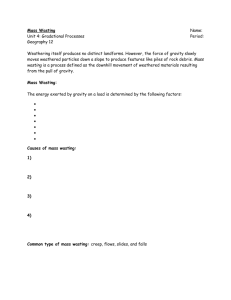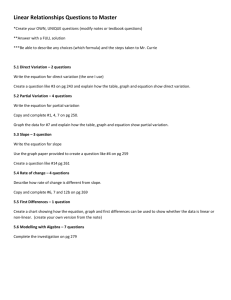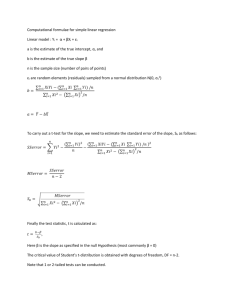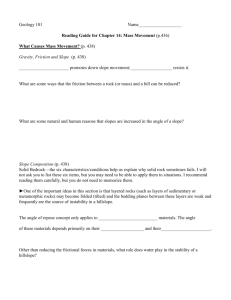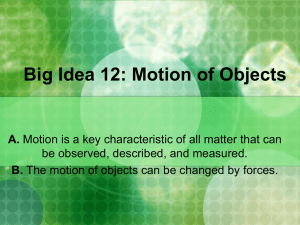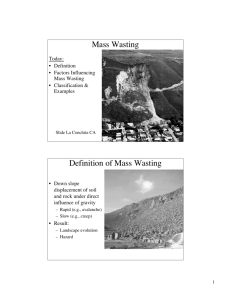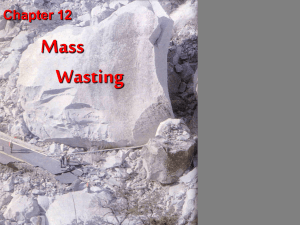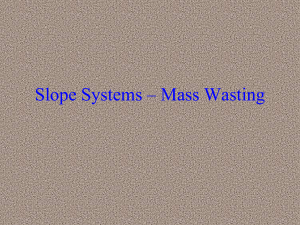Mass Wasting
advertisement
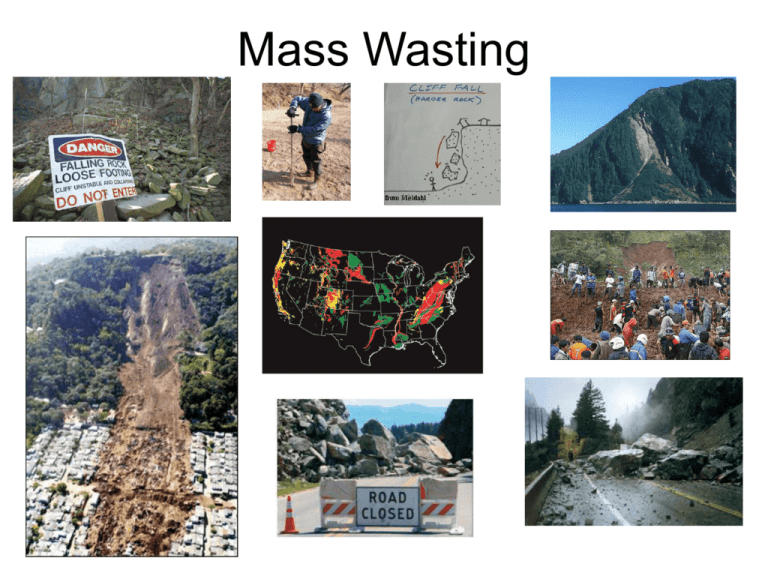
Mass Wasting Objectives • • • • • Definition Types and Rates Causes or Factors Involved Effects Significance Definitions • Mass movement/wasting involves down slope movement of rock, regolith, and soil under the direct influence of gravity. The earth materials behave as solids or viscous masses, and may be consolidated (compacted and cemented) or unconsolidated (loose and uncemented). Movement occurs when the force or gravity exceeds the resisting force (slope stability). • Angle of repose refers to the natural angle formed by loose, unconsolidated materials (gravel, sand, soil, etc.). The angle of repose is the angle at which loose material sits at rest. Typically 25 - 40 degrees. Types of Mass Wasting Types (cont.) Rates of Mass Wasting • Rapid Movement (1 m/sec to >100 km/hr) – – – – Rockfalls Mudflows Debris flows Rock slides or rock avalanches • Moderate Movement (1 cm/day to 1 cm/sec) – Slumps – Earthflows – Debris slides • Slow Movement (1 mm/yr to 1 mm/day) – Creep – Solifluction Causes/Factors • Oversteepening of Slopes/Slope Gradient – By humans (road building, etc.) – Natural processes (i.e. tectonics, stream and wave erosion, etc.) • Addition of water to a slope – – – – Adds weight (~8 lbs/gal) Lubricates loose material, reduces friction Adds pressure called pore water pressure Reduces cohesion by displacing air and destroying surface tension • Removal of vegetation – Decreases soil cohesion when roots decay – Plants adsorb water, decreasing saturation limit of the slope material Causes/Factors (cont.) • Overloading – weight of buildings or other structures – Dumping, filling, or piling up material • Geology – rocks dipping (incilned) in the same direction as the slope – Bedding planes and Fractures serve as zones of weakness • Triggering Mechanisms – – – – – Excessive amounts of water Earthquakes Volcanic eruptions Vibrations Noise What Can Be Done? • Slope Dewatering • Slope Reduction – Cut and Fill – Benching • Stabilizing Structures – Retaining Walls – Rock Bolts Summary • Mass wasting is the movement of earth materials downslope under the influence of gravity • Controls and Triggers include: water, oversteepened slopes, removal of vegetation, earthquakes, rock type, land use types, etc. • Types include: slumps, slides, flows, and falls • The rate of mass movement may be rapid, moderate, or slow depending on the type of material Mass Wasting Video Links: http://www.youtube.com/watch?v=jHrPwzbqNyM&feature=related http://www.youtube.com/watch?v=4PF4Y3P88GQ&feature=related http://www.youtube.com/watch?v=0FRf6FF6KxA&feature=related http://www.youtube.com/watch?v=B4XjmIAxOfA&feature=related http://www.youtube.com/watch?v=AiczROnfGbc&feature=related http://www.youtube.com/watch?v=KGh4g399wpc&feature=related http://www.youtube.com/watch?v=pJF-RhL4TvE
